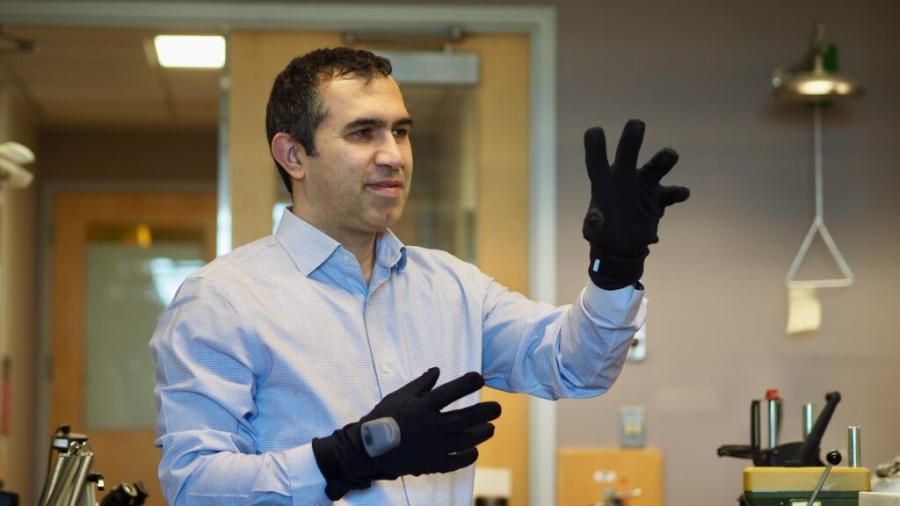
UBC electrical and computer engineering professor Dr. Peyman Servati demonstrating the smart glove. Photo credit: Lou Bosshart/UBC Media Relations
This month we learn about conducting research with Indigenous Peoples and Lands in a good way. See how a new smart textile technology developed at UBC has been used in a groundbreaking “smart glove”. Plus, hear about a study conducted in part by graduate student Dunigan Folk that shows that some activities we thought made people happy lack evidence to prove they actually do boost mood levels.
‘Smart glove’ can boost hand mobility of stroke patients
UBC, in collaboration with a Vancouver startup, has developed an innovative washable wireless smart textile technology, which also holds potential applications in virtual reality and American Sign Language translation. This month, a cohort of stroke survivors in British Columbia will undergo testing of a novel technology aimed at facilitating their recovery and ultimately restoring the functionality of their limbs and hands.
These participants will utilize a groundbreaking "smart glove" designed to monitor their hand and finger movements during rehabilitation exercises under the supervision of Dr. Janice Eng, a prominent stroke rehabilitation specialist and professor of medicine at UBC. The glove incorporates an advanced network of highly sensitive sensor yarns and pressure sensors intricately woven into a comfortable, stretchy fabric. This design allows the glove to meticulously track, capture, and wirelessly transmit even the minutest hand and finger movements. Read more.
How to conduct scientific research with Indigenous Peoples and Lands in a good way
How can researchers ensure that their scientific endeavors are conducted in an ethical manner, serving the interests of the Indigenous Peoples involved and not imposing additional burdens on Indigenous scholars?
In a commentary featured in Nature Ecology & Evolution, Dr. Andrea Reid, the lead researcher at the UBC Centre for Indigenous Fisheries, Dr. Catherine Febria, an assistant professor at the University of Windsor, and Dr. Deborah McGregor, a professor at York University, along with their collaborators, delineate four crucial components for engaging in ecological research with and for Indigenous Peoples and Lands in a respectful manner. In this Q&A, they delve into these elements and underscore their significance for the broader scientific community. Read more.
What really makes us happy?
From meditation to smiling, UBC researchers take a second look at studies claiming to reveal what makes us happy. Psychology professor Dr. Elizabeth Dunn and graduate student Dunigan Folk conducted a study which found that some activities people associate with happiness lack scientific evidence to prove they actually boost your mood. Read more about their work in Scientific America.